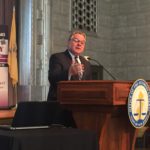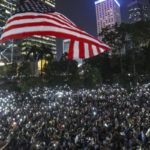Smith Addresses International Ministerial to Advance Religious Freedom
Emerging Trends in Religious Freedom
excerpts of remarks by Rep. Chris Smith (R-NJ) at the
2019 Ministerial to Advance Religious Freedom
Harry S. Truman Building, Washington, DC July 17, 2019
Vice President Pence, Secretary Pompeo and Ambassador Brownback are doing amazing things not just this week but year-round to better protect all people of all faiths to more freely exercise their fundamental human right to believe in God, the transcendent and the eternal. They—and their colleagues at State—are vigorously using the tools embedded in laws like the Frank R. Wolf International Religious Freedom Act including:
- timely and faithful designation of “Country of Particular Concern” (CPC) status for religious freedom offenders,
- the meting out of sanctions on CPC designated countries,
- holding not just countries but individuals who persecute to account,
- enhanced religious freedom training for the U.S. foreign service including ambassadors, and
- integrating religious freedom into every aspect of U.S. foreign policy.
The world of faith is under siege.
We are at a tipping point—threats are multiplying by the day making this ministerial, and comprehensive follow-up especially necessary and urgent.
Almost four decades ago, I read a book that had a profound impact on my life. That book was Tortured for Christ by Romanian pastor Richard Wurmbrand. More than any other, this book introduced me to the horrors faced by Christians living under Communism.
Pastor Wurmbrand’s account of the 14 years he spent in Communist prisons—the torture, the solitary confinement, the mental cruelty and starvation—was both gripping yet, paradoxically, hopeful.
His story detailed horrible suffering, but it was also a story of endurance, courage, and an indomitable spirit.
That book—and several trips to communist countries including the Soviet Union, the Warsaw Pact nations and China—made me better understand Alexander Solzhenitsyn’s astute observation that communism doesn’t merely deny God’s existence, it hates Him.
Solzhenitsyn called it “militant atheism” and that God-hatred continues to thrive today within dictatorships like North Korea, Vietnam and China.
I have dedicated my life in the U.S. Congress, for the past 39 years, to fighting for religious freedom and giving a voice to the voiceless.
Our world is filled with people in need. Unborn children; victims of human trafficking; people suffering the agonies of addiction and abuse; persons with disabilities, including autism; disabled veterans, and those facing famine and disease.
In some areas, slow progress is being made. New treatments are developed. Laws are passed, like the Trafficking Victims Protection Act which I authored to protect victims and aggressively prosecute those who profit from human trafficking.
But there has been little progress in ending religious persecution. In fact in some places like China it’s getting worse.
The terrible, largely unacknowledged reality is this: We are witnessing in the early 21st century an international mega-crisis in religious freedom.
Religious persecution is festering and exploding around the world.
This crisis creates tens of millions of victims and undermines liberty, prosperity and peace.
More than ever before, strong international leadership and diplomacy on a sustainable basis are needed to address religious freedom violations globally.
It is no coincidence that the biggest threats to peace, the rule of law and respect for universally recognized human rights come from those governments most violently opposed to religious freedom.
No government or terrorist group can deny or suppress this essential freedom.
But the world is still not doing enough to address one of the world’s most pressing problems.
Tortured for Christ was published 60 years ago, but its message remains relevant today. All people of faith and conscience must shake off complacency toward the torture and persecution faced by religious communities globally.
We cannot be silent when Rohingya Muslims are brutally “cleansed” from Burma.
We cannot allow Nigerian Christians to face horrifying violence without acting.
We cannot allow again the genocide faced by Iraqi Christians and Yazidis at the hands of ISIS.
We cannot allow over a million Uyghur and other Turkic Muslims to be interned without speaking out.
We cannot allow the anti-Semitism spreading like a cancer around the globe to fester. Natan Sharansky—the heroic Soviet Jewish former prisoner of conscience—told a hearing I chaired that the new anti-Semitism includes virulent hatred of Israel and the Jews who live there and can be identified by what he calls the three Ds test: denial of Israel’s right to exist, demonization of Israel and the double standard of treatment by the United Nations and others.
Elan Carr, the Trump Administration’s Special Envoy on Monitoring and Combatting anti-Semitism is aggressively and effectively using every diplomatic tool at his disposal—please work with him and his team in your country.
Several years ago, I visited Archbishop Ignatius Kaigama in the city of Jos, Nigeria. While there I met survivors of attacks by the terrorist group Boko Haram.
One of the survivors I met at an IDP camp was Habila Adamu, who told me he was dragged out of his home by four Boko Haram terrorists and with an AK-47 assault rifle pressed to his face was told to renounce his Christian faith or die.
He refused twice—and the terrorist shot him in the face.
By some miracle, he survived. I invited him to a congressional hearing in Washington where he told us that he wanted justice for the atrocities committed by Boko Haram, but he was more determined to show Christ’s love to the terrorist who tried to take his life.
What a courageous man of faith.
Today, Boko Haram isn’t alone in terrorizing Christians in Nigeria. In 2018 alone, Fulani herdsman killed thousands of Christians in the Middle Belt of Nigeria. This escalating threat needs more attention.
At the height of the ISIS genocide, I went to Erbil, Iraq to press the U.S. and the U.N. to provide humanitarian aid to genocide survivors.
I went to an IDP camp with 6,000 refugees, which had at that time never been visited by a US official. Not once. Under the Obama Administration, not one penny of U.S. or U.N. humanitarian aid was spent on this camp-or other—which was funded primarily by the Knights of Columbus and other charities in the U.S. and Europe.
The U.S. consulate did not want me to go, saying it was unsafe. So, I hitched a ride with the Archbishop Warda of Erbil and was greeted by a children’s choir singing Christmas hymns in Aramaic. It was a remarkable and moving moment.
I sat with those Christians and heard stories of ISIS atrocities, the desecration of churches, the crucifixions of young men who refused to join ISIS, and the sexual slavery forced on some young Christian girls. I also heard stories of hope, faith, and charity—and joined in prayers for the persecuted and those who persecute.
Led by Vice President Pence and USAID Administrator Mark Green, these victims of genocide are today getting humanitarian assistance.
I want to tell one more brief story and talk about the war on religion occurring China and to urge a more concerted response from the international community.
At a recent hearing I chaired in Congress, Mihrigul Tursun told a story about how she pleaded with God to end her life as her Chinese jailers increased the electrical currents coursing through her body.
Tursun, a Muslim Uyghur whose escape led her to the United States last September, broke down weeping as she told the story of her torture and detention in one of China’s infamous “political education camps.”
It is an appalling story but one that is all too familiar in President Xi Jinping’s China. The world can’t ignore what’s happening there. We must all stand up and oppose what are some of the world’s worst human rights violations.
I am discouraged by the silence, or active complicity, of the international community when confronted by the many appalling stories coming out of China.
The most recent example being the 37 or so nations who signed a letter defending the Chinese government’s mass surveillance and internment of over one million Uyghurs and others Turkic Muslims.
What a shameful act in pursuit of the Chinese government’s Belt and Road funds. That shame is compounded by the fact that it is abundantly clear that President Xi Jinping has overseen one of the most repressive periods in the post-Mao era.
The ruling Chinese Communist Party has undertaken the most comprehensive attempt to manipulate and control—or destroy—all religious communities since Chairman Mao Zedong made the eradication of religion a goal of his disastrous Cultural Revolution half a century ago.
Now Xi, fearing the power of independent religious belief as a challenge to the Communist Party’s legitimacy, is trying to radically transform religion into the party’s servant, employing a draconian policy known as sinicization.
Under sinicization, all religions and believers must comport with and aggressively promote communist ideology—or else.
To drive home the point, religious believers of every persuasion are harassed, arrested, jailed or tortured. Only the compliant are left relatively unscathed.
Bibles are burned, churches destroyed, crosses set ablaze atop church steeples and now, under Xi, religious leaders are required to install facial-recognition cameras in their places of worship. New regulations expand restrictions on religious expression online and prohibit those under age 18 from attending services.
Government officials are also reportedly rewriting religious texts—including the Bible—that remove content unwanted by the atheist Communist Party, and have launched a five-year sinicization plan for Chinese Protestant Christians.
But what can be done more generally in response to Xi’s war on religion? The United States and several European countries have condemned it, but any nation that values freedom of religion should unite in denouncing China’s treatment of Muslim Uighurs, Christians, Tibetan Buddhists and Falun Gong practitioners.
In particular, Muslim-majority countries must protest these abuses even at the risk of endangering the benefits from China’s “Belt and Road” infrastructure projects.
The Trump Administration has strongly condemned China’s war on religion.
Sen. Marco Rubio (R-Fla.) and I have also urged the use of Global Magnitsky Act sanctions to target Chinese officials responsible for egregious human rights abuses.
We have sought expanded export controls for police surveillance products and sanctions against businesses profiting from the forced labor or detention of Uyghurs.
We have also introduced the bipartisan Uyghur Human Rights Policy Act of 2019 to provide the administration with new tools to comprehensively address the abuse.
I would urge other governments present here today to issue their own sanctions and export controls and to pass some version of the Uyghur Human Rights Policy Act in their own parliaments.
We must be working together to let the Chinese Communist Party know that taking a hammer and sickle to the cross and enslaving more than 1 million Uyghurs to erase their religion and culture are destructive, shameful acts of genocide that will not be tolerated by the community of nations.











for Congressman Chris Smith: while many Dems are impossibly focused on taking down the President, he does good things on the job, every day! See articles below: while Dems muck around and do nothing but hold repetitious, nasty hearings,and spout their childish, three-year-old frustrations-at losing the presidency, Chris Smith actually passes laws that HELP people: and tries to address important problems, like the horrible, ongoing child trafficking. We notice, and we thank you, Chris!